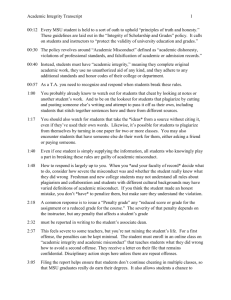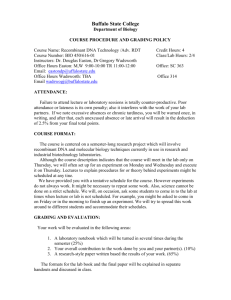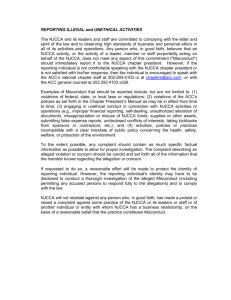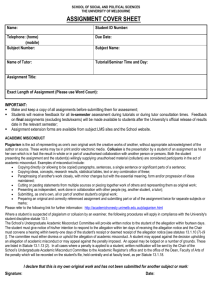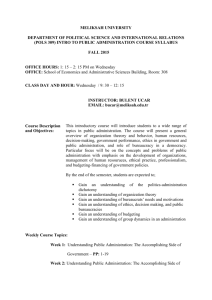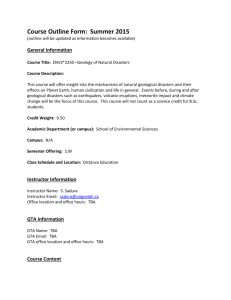Guidence on academic misconduct
advertisement
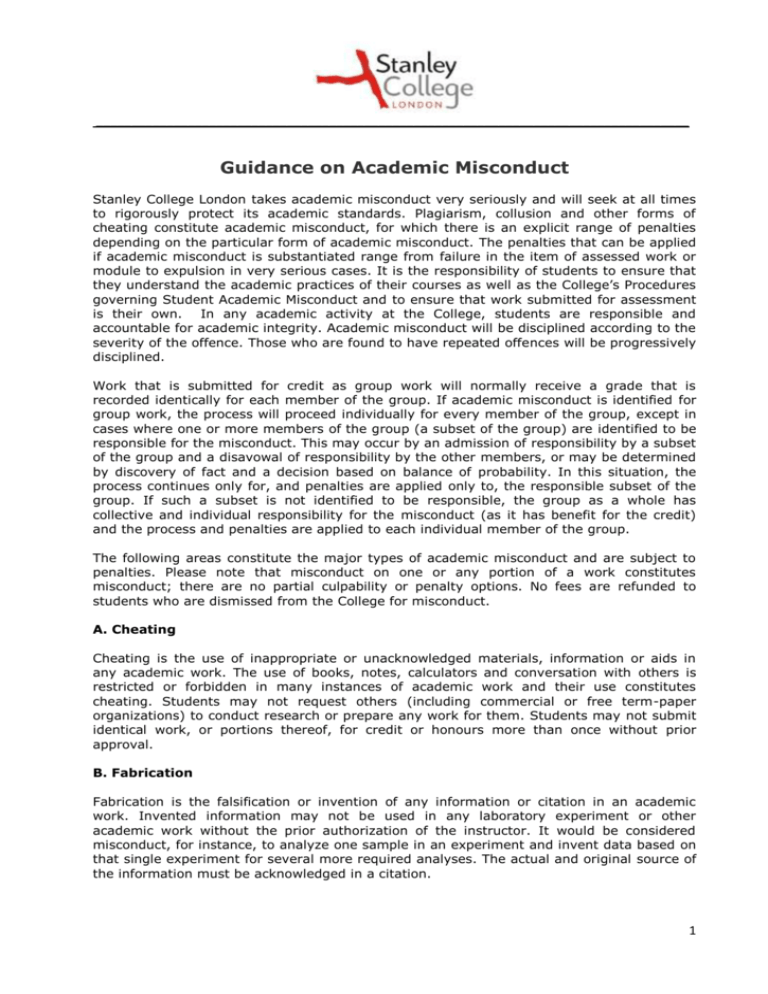
____________________________________________________________________________________ Guidance on Academic Misconduct Stanley College London takes academic misconduct very seriously and will seek at all times to rigorously protect its academic standards. Plagiarism, collusion and other forms of cheating constitute academic misconduct, for which there is an explicit range of penalties depending on the particular form of academic misconduct. The penalties that can be applied if academic misconduct is substantiated range from failure in the item of assessed work or module to expulsion in very serious cases. It is the responsibility of students to ensure that they understand the academic practices of their courses as well as the College’s Procedures governing Student Academic Misconduct and to ensure that work submitted for assessment is their own. In any academic activity at the College, students are responsible and accountable for academic integrity. Academic misconduct will be disciplined according to the severity of the offence. Those who are found to have repeated offences will be progressively disciplined. Work that is submitted for credit as group work will normally receive a grade that is recorded identically for each member of the group. If academic misconduct is identified for group work, the process will proceed individually for every member of the group, except in cases where one or more members of the group (a subset of the group) are identified to be responsible for the misconduct. This may occur by an admission of responsibility by a subset of the group and a disavowal of responsibility by the other members, or may be determined by discovery of fact and a decision based on balance of probability. In this situation, the process continues only for, and penalties are applied only to, the responsible subset of the group. If such a subset is not identified to be responsible, the group as a whole has collective and individual responsibility for the misconduct (as it has benefit for the credit) and the process and penalties are applied to each individual member of the group. The following areas constitute the major types of academic misconduct and are subject to penalties. Please note that misconduct on one or any portion of a work constitutes misconduct; there are no partial culpability or penalty options. No fees are refunded to students who are dismissed from the College for misconduct. A. Cheating Cheating is the use of inappropriate or unacknowledged materials, information or aids in any academic work. The use of books, notes, calculators and conversation with others is restricted or forbidden in many instances of academic work and their use constitutes cheating. Students may not request others (including commercial or free term-paper organizations) to conduct research or prepare any work for them. Students may not submit identical work, or portions thereof, for credit or honours more than once without prior approval. B. Fabrication Fabrication is the falsification or invention of any information or citation in an academic work. Invented information may not be used in any laboratory experiment or other academic work without the prior authorization of the instructor. It would be considered misconduct, for instance, to analyze one sample in an experiment and invent data based on that single experiment for several more required analyses. The actual and original source of the information must be acknowledged in a citation. 1 ____________________________________________________________________________________ C. Plagiarism Plagiarism is the representation of the words or ideas of another as one’s own in any academic work. To avoid plagiarism, every direct quotation must be identified and properly cited in the text or as noted in Cites and Sources. Acknowledgement of sources is required when material from another source, stored in print, electronic or other medium, is quoted, paraphrased or summarized in whole or in part. Faculty members have the right to submit a student’s work for electronic detection of plagiarism or to require that the student submit his or her own work for detection of same. Students should be aware that plagiarism of any part of a work is academic misconduct; there is no partial culpability or penalty. Plagiarism can be subtle, so it should be discussed with the instructor. D. Facilitating Academic Misconduct Students who knowingly or negligently allow their work or portions of their work or drafts of their work to be used by other students or who otherwise aid others in committing academic misconduct are violating academic integrity. This applies to students who hide, misrepresent or falsify information related to an incident of academic misconduct. Such students are as guilty as a student who receives and uses the material or is involved in the incident directly, even though they may not themselves benefit from that act of misconduct. E. Denying Access to Information or Material It is a breach of academic integrity to deny others access to academic resources or to deliberately impede the progress of another student or scholar. This would include giving other students false or misleading information, making library or shared resource material unavailable to others by stealing, deliberately misplacing, defacing or destroying any of these resources, including computer files that are not one’s own. F. Misconduct in formal examinations This includes having access, or attempting to gain access, during an examination, to any books, memoranda, notes, unauthorised calculators, or any other material, except such as may have been supplied by the invigilator or authorised by official university bodies. It also includes aiding or attempting to aid another candidate or obtaining or attempting to obtain aid from another candidate, or any other communication within the Examination Room. Academic Misconduct Process In all instances, the instructor will keep and secure any and all documents related to an incident until the process is complete. When an instructor suspects an offence has occurred, the student(s) will be required to meet with the instructor within five working days to discuss the incident. If the situation is shown, to the instructor’s satisfaction, to be free of academic misconduct, no record will be kept of the incident. If the instructor or program coordinator determines that an offence has occurred, perhaps without identifying the offenders or severity of the offence completely, a formal process will be started and records will be kept. The process involves the following: The first part of an Academic Misconduct form will be completed by the instructor for every student involved in the incident. The Office of the Registrar will be contacted to determine if previous instances of academic misconduct are on file for those students. A previous 2 ____________________________________________________________________________________ incidence will determine the minimum penalty available as per the Penalties for Academic Misconduct. The student(s) will be required to meet with the instructor and a witness (preferably the program co-ordinator) within five working days of the form being completed to discuss the offence. The student(s) will meet individually with the instructor and a witness. The witness will keep notes during this discussion, and a copy of the Academic Misconduct form(s) will be given to the student(s). If individual responsibility in a group situation can be established by balance of probabilities to the satisfaction of both the instructor and witness during this stage, the process is discontinued for members of the group that do not bear responsibility for the incident and the Academic Misconduct form for the latter are destroyed. If any student is unresponsive or unwilling to meet, the process will move to the next step after the five days have elapsed. The Academic Misconduct form and the notes will be passed on to the Principal of the student’s program. The student(s) will be required to meet with the instructor (and/or witness) and the Principal of the student’s program within five working days of the meeting with the instructor to discuss and make the decisions required in the second part of the form. The signature of the student and the Principal acknowledge the decision made by the student. The next steps arising from the decision made by the student are discussed with the student. If the student is unresponsive or unwilling to meet, the Academic Misconduct form is forwarded to the Office of the Registrar for processing. Only the Principal will sign in this instance. If the student wishes to appeal the sanction, he or she must follow the appeal procedures outlined. Otherwise, the Registrar will process the sanction within five working days. A revelation of previous offence(s) from the student’s record may result in the penalty being increased, and the student will be so notified. The Academic Misconduct form will remain part of the student’s file in the Office of the Registrar for one year after graduation. No indication of academic misconduct will be made on a student grade report or transcript. As with other documents in the student’s file, access is restricted by the Freedom of Information and Protection of Privacy Act. Appeals If dissatisfied, the student(s) may appeal. The twenty one calendars day period in which the appeal must be lodged will commence from the date of the formal letter notifying you of the Misconduct Panel's decisions. An appeal against an Exam Board decision which was affected by a misconduct finding, lodged after the Exam Board has applied the penalty decided by the Panel, will be considered for admissibility on the merits of the case. Penalties to be applied The penalties that may be applied vary depending on whether the misconduct is minor or major. A. Minor Misconduct The following penalties are applied by the Principal but they are also available to the panel for application: (a) For cases which are technically proven but believed to be unintentional/trivial, no further action than a caution and/or reprimand; 3 ____________________________________________________________________________________ (b) For cases in which the work should be resubmitted you will be required to correct work by including references, etc., and the examiner will reassess; (c) Reduction of mark to an extent that is short of causing overall failure of the course. B. Major Misconduct The following penalties are available to the panel for application: (a) Deduction of marks such as to cause course failure; (b) Directly reducing the mark for the course to zero; (c) Disqualification from the award of Honours; 4

